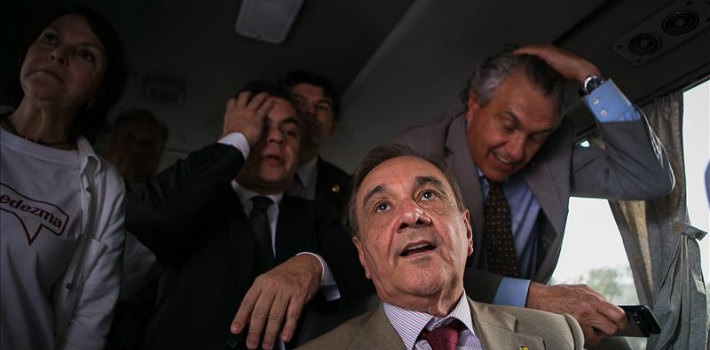
Español“Unacceptable” was the word the Brazilian government used to describe the harassment suffered by a group of its senators in Venezuela, who were prevented from visiting jailed Venezuelan opposition leader Leopoldo López on Thursday, June 18.
Even though it was planned as an official visit, the Venezuelan government’s trickery began the moment the delegation’s bus departed Maiquetía International Airport in Vargas state.
Coincidentally, local authorities decided to carry out maintenance that same morning on two tunnels that connect the coastal state with the Venezuelan capital. As the Brazilian senators made their way to Caracas, a group of roughly 50 Venezuelan government supporters stopped and attacked the delegation’s bus with sticks and stones.
Meanwhile, a nationally televised address from President Nicolás Maduro clogged up the country’s airwaves, meaning only online media could report the incident.
Dissent Unwelcome in Venezuela
It did not take long for the Brazilian government and President Dilma Rousseff to express their discontent and demand an explanation from Venezuelan authorities.
Legislators from the ruling United Socialist Party of Venezuela, however, described the incident as a “media stunt.” Venezuelan Ombudsman Tarek William Saab criticized the Brazilian delegation’s presence in the country. He says Venezuela has been on the receiving end of a number of “entirely unfriendly visits,” referring to a recent attempt by former Spanish President Felipe González to meet with political prisoners.
Venezuelan authorities claim they had to shut down the Caracas-La Guaira highway to transfer a criminal suspect who had been extradited from Colombia. However, the prisoner transfer had in fact been completed much earlier on Thursday, approximately 10 hours before the senators departed for the Venezuelan capital.
In the end, the Brazilian delegation was never able to leave Vargas state. The attack on their bus forced them to return to the main airport terminal in Venezuela, where neither the Brazilian embassy nor the Foreign Affairs Ministry could get the Venezuelan government to allow their passage to Caracas.
Eight hours later, after all attempts had failed, the Brazilians had no other choice but to return to their country. Besides meeting with Leopoldo López, they had also planned to speak with members of the Democratic Unity Roundtable (MUD), as well as the governor of Miranda and opposition leader Henrique Capriles Radonski.
Despite failing to carry out their stated objectives, this incident has helped to show the world the sort of abuses that Venezuelan dissidents face on a daily basis.
While every Brazilian newspaper ran this story on their front page, media censorship in Venezuela meant there would be no mention of this event at all, other than through digital outlets.
Brazilian Congress Responds
Hours after the attack on the Brazilian senators, President Dilma Rousseff called Foreign Minister Mauro Vieira to a meeting at the presidential palace. The administration issued an official statement condemning the senators’ harassment and noting that the delegation had official support and had traveled to Venezuela on a Brazilian Air Force aircraft.
Former presidential candidate Aécio Neves led the group of opposition senators in their attempt to reach Caracas and has openly expressed concerns about the Venezuelan government’s targeting of opposition leaders. After arriving in Brasilia, the officials asked the Rousseff administration to report the lack of freedom in Venezuela to the regional bodies Mercosur and Unasur.
“We will demand a harsh stance from the Brazilian government, and in case it doesn’t comply, we will push for the necessary response in defense of democracy through political and legislative means,” Neves told EFE news agency.
 Versión Español
Versión Español












